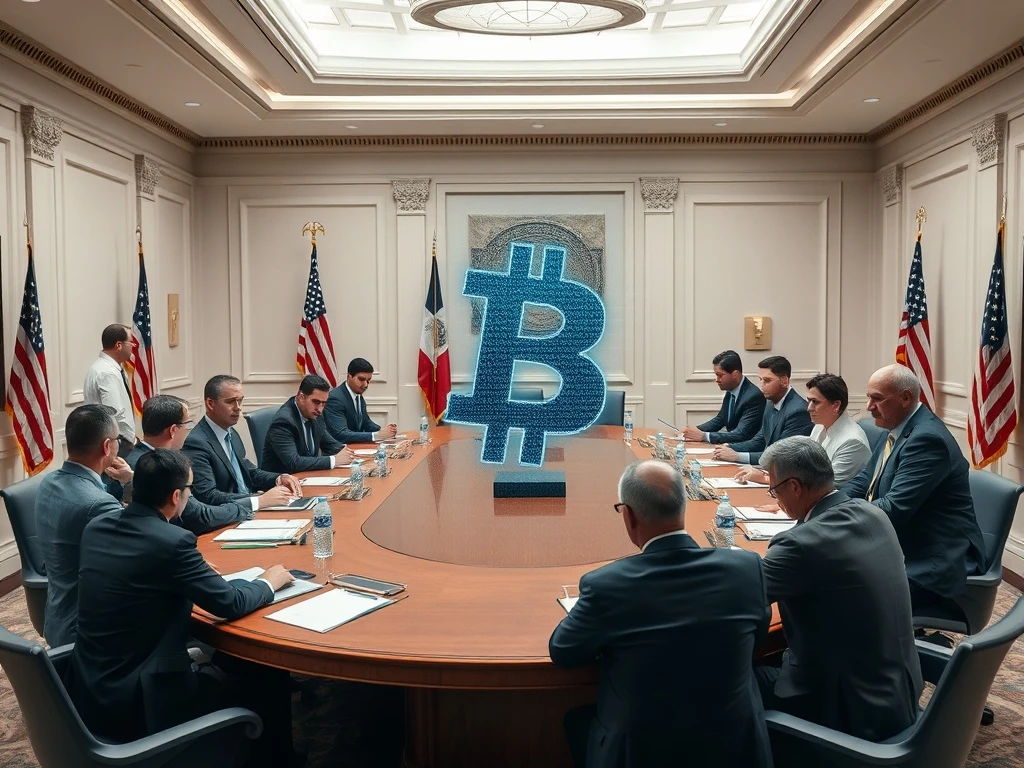Crucial Crypto Regulation: US Lawmakers Advance Bitcoin Reserve and Market Structure Bills

Recent high-level meetings in Washington D.C. signal a pivotal moment for **crypto regulation** in the United States. Lawmakers and industry leaders gathered to discuss crucial legislation. These discussions could shape the future of digital assets. The crypto community keenly watches these developments. They anticipate clearer guidelines and a more stable operating environment.
Shaping the Future of a Strategic Bitcoin Reserve
US lawmakers and cryptocurrency executives recently convened for vital discussions. These talks focused on establishing a strategic **Bitcoin reserve**. On Tuesday, a notable roundtable event took place. Alaska Representative Nick Begich and Ohio Senator Bernie Moreno were present. They met with MicroStrategy co-founder Michael Saylor. The discussion centered on the proposed BITCOIN Act. This bill aims to create a national Bitcoin (BTC) reserve. The Digital Chamber advocacy organization hosted this important event. Its affiliates, the Digital Power Network and Bitcoin Treasury Council, also participated. This meeting underscores a growing interest in national digital asset strategies.
Hailey Miller, Director of Government Affairs at Digital Power Network, commented on the consensus. She stated, “Legislators and executives agree there is a need for a Strategic Bitcoin Reserve law.” This law would ensure America’s financial future and longevity. Most attendees are now looking for immediate next steps. This may involve integrating the Strategic Bitcoin Reserve (SBR) into existing policy frameworks. The BITCOIN Act is expected to codify a March executive order. This order, signed by US President Donald Trump, could open a legal path. It would allow the government to hold up to 1 million BTC in a national reserve. Such a reserve could bolster national security and economic stability.
Advancing Crypto Market Structure Legislation
Separately, Republican lawmakers engaged with crypto company executives. House Speaker Mike Johnson and House Financial Services Committee Chair French Hill attended. Majority Whip Tom Emmer also participated. Coinbase CEO Brian Armstrong was among the industry leaders present. Their Tuesday meeting addressed key issues in the industry. These talks included advancing **market structure** legislation. The House of Representatives already passed a version of this bill in July. This indicates significant legislative momentum.
Furthermore, a third roundtable discussion occurred on Wednesday. Republican leaders on the Senate Banking Committee participated. Wyoming Senator Cynthia Lummis reportedly joined the talks. This meeting considered the advancement of a Senate market structure bill. Republican senators indicated their version is in development. They tentatively call it the Responsible Financial Innovation Act. This bill builds upon the CLARITY Act, passed by the House in July. A committee vote for the Senate version is expected by late September. This legislation seeks to clarify regulatory roles. It will define how US financial agencies oversee crypto regulations. Clarity is paramount for industry growth and investor protection.
Intensified US Lawmakers’ Focus on Crypto Legislation
These three distinct roundtable discussions send a clear message. Republican lawmakers are intensifying their focus on **crypto legislation**. These meetings followed a month-long recess in September. The renewed legislative push indicates growing momentum. Congress is prioritizing bills related to the crypto and blockchain industry. Key bills currently under consideration include:
- The BITCOIN Act: Aims to establish a strategic national Bitcoin reserve.
- Market Structure Bills: Designed to clarify regulatory oversight for digital assets.
Significantly, these efforts aim to provide regulatory clarity. They seek to foster innovation within the US market. The discussions highlight a bipartisan understanding of crypto’s importance. Industry leaders continue advocating for clear rules. Therefore, these ongoing dialogues are crucial. They lay the groundwork for a robust regulatory framework. The outcomes will likely influence the global crypto landscape. Ultimately, the industry awaits concrete legislative progress. This will define the future operating environment for digital assets in America.










